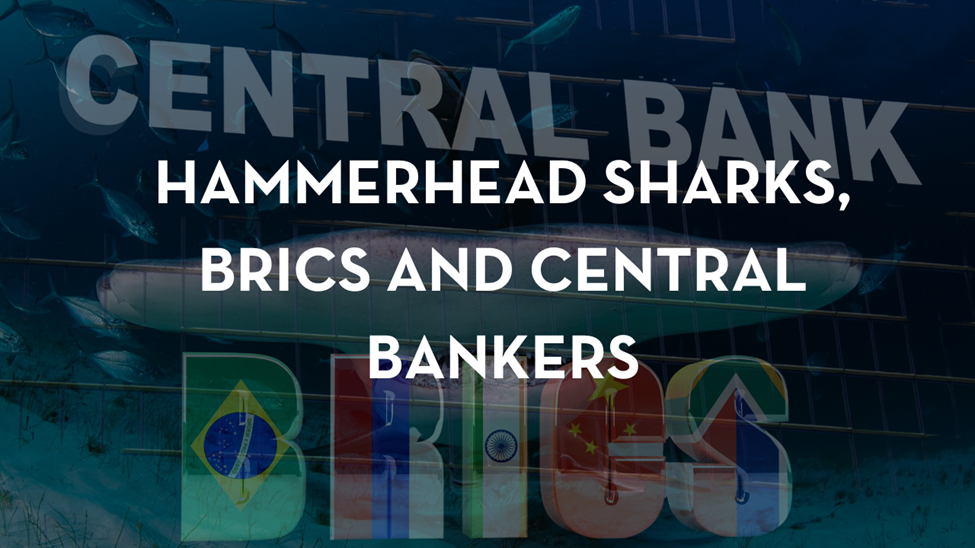
This week the world has needed the eyes of a hammerhead shark in order to keep track of the meetings that are taking place.
First up the BRICS nations, and interested parties, met in Johannesburg for the 15th summit of the group.
And, yesterday saw the start of the Fed’s annual three day Economic Policy Symposium at Jackson Hole, Wyoming.
The BRICS event has the potential to affect how we map the world in the coming years, whereas Jackson Hole is one that may cause some reaction in the markets but it’s unlikely to dramatically change the course of the global stage.
In many respects, it is the actions of central bankers that has led to the BRICS’ formation. The need by the Fed to push dollars on the world, driving cheap credit and indebting those nations that have far less geopolitical clout than themselves, has led to major imbalances. Other Western banks have followed along like lemmings, realising that this was an alliance they could benefit from.
What have the BRICS achieved?
But the BRICS (and the multiple other countries hoping to sign up) have had enough. As Xi Jinping stated (in a speech delivered by his commerce minister) there is a country that is “obsessed with maintaining hegemony, [and] has gone out of its way to cripple the emerging markets and developing countries”.
How much will immediately change as a result of the BRICS meeting, this week? Immediately nothing. But with the invitation to Argentina, Egypt, Ethiopia, Iran, Saudi Arabia and the United Arab Emirates to join, then we could start to see some changes in the coming months and years.
Overall, there does seem to be an agreement to move payments away from the dollar, not with a common currency but by making it easier and more efficient to pay in local currencies. But, this was already in motion and had been accelerating since Russia’s faced dollar sanctions. The freezing of Russia’s FX reserves was the catalyst the BRICS needed to start making changes.
Do the Purse Holders Even Care?
Much of the focus in the BRICS speeches has been in regard to the need for a new world order. It has almost been a call to (geopolitical and financial) arms by the five representatives of each country who have spoken. How nervous will this make the central bankers meeting in Jackson Hole? If past performance is anything to go by, then not much. They rarely notice things before they happen.
Central bankers are rapidly looking like the losing team in a relay race, standing waiting for someone to give them the baton to tell them what’s going on, rather than looking behind to see what’s coming up and about to take them over. After all, last year they were trying to cover themselves for not clocking onto inflation early enough.
It was almost easy at Jackson Hole last year – they just had to say some strongly worded things to convince markets that they would come down hard on inflation.
This year isn’t so easy. It’s now about fine tuning. The theme of the meeting is “Structural Shifts in the Global Economy”. A catch-all statement. Whilst last year was much about blaming the fallout from the Ukraine war and the pandemic for inflation, this year it’s about acknowledging that those inflationary events have in fact led to major structural and behavioural changes across the globe. Not to mention, the clean up after decades of easy money.
This year central bankers have just had to do a bit of housekeeping when it comes to inflation. Now it’s the deep clean, it’s the structural changes. It’s when things get shaky.
All eyes and worries on the US and China
The Fed is faced with a dichotomy of trying to combat inflation but not go too hard and fast so as to make things too expensive for businesses and consumers. The labour market is strong, but loan repayments are falling and savings are being depleted. Spending is out of control and there is the minor issue of being over $32 trillion in debt.
Meanwhile, markets are starting to get anxious about China’s economy. Usually, China’s bond yields (and wider economy) have long been correlated with the rest of the world, not anymore. They have been dropping, whilst others climb (some contained, others less so).
The economy is fast slowing down, lenders are getting anxious about the ongoing defaults happening across property developers. The high debt burden is weighing heavy on China’s crown.
China’s economic woes have only served to exacerbate those issues already faced by the Federal Reserve. Whilst a slowdown in China may not be as impactful as say the bursting of the US housing market bubble, it will almost certainly negatively impact global demand and supply for goods.
And these are just two of the world’s major economies, we haven’t even mentioned the ECB or the basket case that is the Bank of England.
Listen to Jay
Markets will tomorrow pay close attention to what Fed Chair Jay Powell says. Last year he delivered his most hawkish speech to date.
This year, It is expected that he will side step making any short-medium term commitments as to what will happen to rate hikes. Softly, softly is likely to be the approach. Considering the theme of the symposium he would be wise to acknowledge the profound shifts going on across the globe whether changes to green energy, trade and currency arrangements, or the institutional frameworks that are no longer fit for purpose. All of these will impact monetary policy and currency markets one way or another.
And this is where gold and silver investors should also consider themselves. Like Jay – don’t worry about the short to medium term. Yes, the gold price right now is a little boring, maybe even disappointing. But enjoy the quiet, maybe even do a little gold shopping. This week wheels have been set in motion towards changes that will set gold and silver right up for the coming months and years.
From The Trading Desk
Market Update
The gold market this week is back above $1,900 and closed up over 1% on Wednesday at $1,915.
Data out of the US on Wednesday showed manufacturing and service sectors contracted more than expected.
The S&P Global Flash US manufacturing PMI dropped to 47% from July’s reading of 49%.
This was a sharp drop from where economists were pricing in, at a relatively unchanged 48.9%.
Activity in the service sector was lower too, falling to 51% from last month’s 52.3% which is a six month low.
It was interesting to see gold move higher on a stronger dollar which was helped by lower US Treasury yields.
Focus now moves to Jerome Powell’s speech at Jackson Hole on Friday.
Again, it’s interest rates that are in focus, investors are looking for reassurance that rates in the US have peaked.
However, they may need to stay higher for longer. Headline inflation has dropped recently from a high of 9.1% to 3.2% but still off its 2% target.
Over the last week, we have continued to see a buy through rate of 90%.
A good mix of existing clients adding to their allocations and new client accounts.
GOLD PRICES ( AM/ PM LBMA FIX– USD, GBP & EUR )
| USD $ AM |
USD $ PM |
GBP £ AM |
GBP £ PM |
EUR € AM |
EUR € PM |
|
|---|---|---|---|---|---|---|
| 23-08-2023 | 1904.55 | 1916.65 | 1505.17 | 1512.24 | 1761.14 | 1767.73 |
| 22-08-2023 | 1901.85 | 1892.75 | 1488.77 | 1487.32 | 1744.76 | 1745.30 |
| 21-08-2023 | 1890.10 | 1889.85 | 1484.86 | 1484.29 | 1734.92 | 1736.39 |
| 18-08-2023 | 1891.75 | 1893.70 | 1488.81 | 1485.99 | 1740.98 | 1741.83 |
| 17-08-2023 | 1893.95 | 1896.35 | 1490.16 | 1486.36 | 1742.81 | 1740.09 |
| 16-08-2023 | 1906.80 | 1904.20 | 1494.55 | 1493.46 | 1744.91 | 1743.87 |
| 15-08-2023 | 1904.10 | 1903.85 | 1497.77 | 1495.47 | 1742.25 | 1740.12 |
| 14-08-2023 | 1913.50 | 1903.75 | 1507.07 | 1507.20 | 1747.79 | 1749.17 |
Buy gold coins and bars and store them in the safest vaults in Switzerland, London or Singapore with GoldCore.
Learn why Switzerland remains a safe-haven jurisdiction for owning precious metals. Access Our Most Popular Guide, the Essential Guide to Storing Gold in Switzerland here


